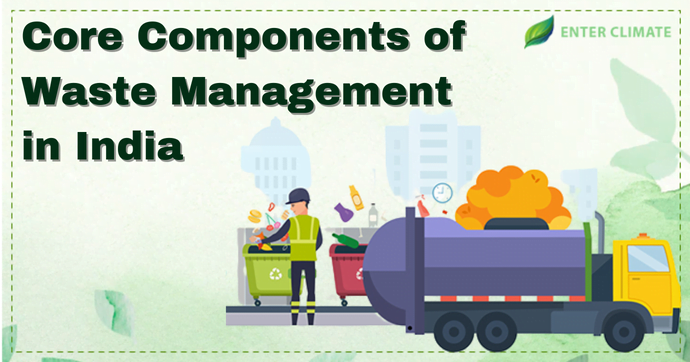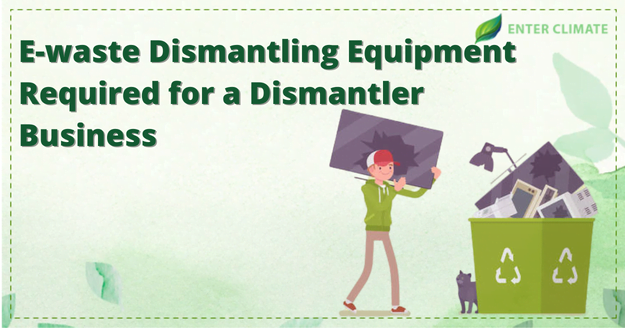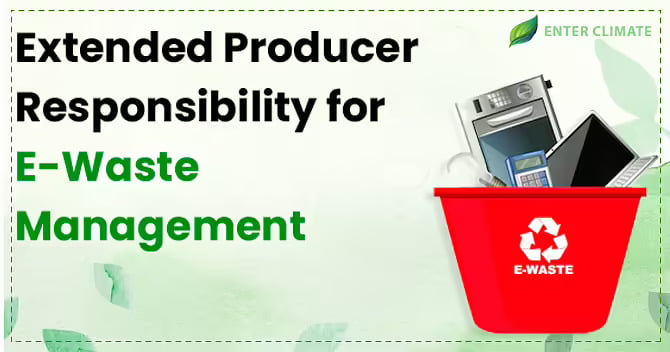Core Components of Waste Management in India
 06 Oct, 2022
06 Oct, 2022 
Waste disposal in India
Waste disposal is one of the most common practices in India. Thus, it is an integral part of waste management in India. Most households discard their waste without taking proper measures, including segregating waste at the source or even discarding it at the proper site. This careless disposal of waste has resulted in an increase in many diseases among people and environmental degradation, which is intensifying uncontrollably. Some of the other consequences of this careless discard of waste include the loss of precious resources, pollution of soil, land, air and food and unliveable environment and health hazards. This has created an alarming situation worldwide, urging the governments and authorities of different countries to take steps regarding proper waste management.
Waste Management in India
Seeing the overwhelming increase in waste in India, the Government, and regulating authorities like the Ministry of Environment, Forest and Climate Change (MoEF&CC)and the Central Pollution Control Board (CPCB) have implemented many policies, guidelines and legislation. This started from amending the Constitution under the 74th Constitution Amendment of the 12th Schedule, where urban local bodies are liable to keep the environment and cities clean. Urban local bodies, due to the burden of other responsibilities and lack of resources, further delegated these responsibilities to producers under the principle of Extended Producers Responsibility (EPR) introduced in Plastic Waste and E-Waste (Management) Rules. There are four segments of Waste Management in India: Municipal, Industrial, Bio-Medical and Waste Electrical and Electronic Equipment (WEEE).
Components of Waste Management of India
The principle of Waste Management in India is mainly based on four basic principles of 4Rs: Refuse, Reduce, Reuse and Recycle. This ultimately contributes to sustainable living and a healthy environment. Further, the core components of Waste management in India include: –
- Waste generation
- Waste collection
- Waste storage
- Secondary collection and transportation
- Recycling
- Treatment and disposal
Waste collection
Primarily under waste management in India, the responsibility of collecting waste is delegated to the city municipality or Urban Local Bodies (ULBs). Moreover, in the case of plastic or e-waste, the Producer Responsibility Organisation (PRO) is given responsibility as part of their EPR. The collection of waste in India is also done by local kabadiwalas or raddiwalas (local rag pickers), who, although they have better reachability than ULBs or producers, contribute primarily to the increase in the dump of waste because of the lack of proper channelisation system.
Waste Transportation
The next factor under waste management in India is transportation. Once the waste is collected by ULBs, local rag pickers or producers/PROs (in the case of plastic or e-waste), it is to be transported or channelled to the recycler or dismantler. This must be done in an environmentally sustainable way.
Waste Recycling
Recycling is another important component of waste management in India. After the waste is transported to the proper channelisation unit, recycling takes place. Under recycling, the waste is firstly segregated by using various techniques and treatments. Recycling waste is defined as the recovery process through which waste materials are reprocessed into different products or materials that can be used as raw materials or end products.
For compliance with these laws, there are many stakeholders present, including: –
- Public Sector: This includes the government authorities and local public departments at the state and city level.
- Private Formal Sector: Private Formal Sector includes registered and authorised units involved in the collection, transport, treatment, disposal and recycling.
- Private Informal Sector: This sector comprises waste pickers, traders, and non-authorised/authorised small-scale units.
- Representatives of the community in the form of NGOs, etc.
Apart from laws, there are many initiatives by the Indian Government, including the Urban Infrastructure Development Scheme for Small & Medium Towns (UIDSSMT)[1] and Jawaharlal Nehru National Urban Renewal Mission (JNNURM). The Government also promotes sustainable development goals at the international level.
Waste Management in India during Covid
The spread of the COVID pandemic highlighted many prevailing issues in the country, including a lack of proper health facilities and infrastructure for proper waste management in India. The scenario indicated the waste dump increasing in number in addition to the new bio-waste, including masks and gloves. According to the latest reports of the CPCB, the average amount of Covid-19-related bio-medical waste during April 2022 is estimated to be 4.67 tonnes per day. Many sources of Covid-19 waste are containment zones/red zones, quarantine facilities/Covid care centres, home quarantine, isolation homes and health care facilities/hospitals/labs. CPCB issued guidelines for the treatment, handling and discharge of Covid bio waste, which was to be separated into various categories such as yellow, red, white and blue.
Because of the lack of proper intervention from the authorities, waste management in India suffered greatly. A considerable amount of waste being dumped on the roadside without any kind of treatment leads to an increase in vulnerability to different infections and diseases in the population living in those areas and to the sanitation workers working in the regions. This may also be chalked up to a lack of proper awareness about the effect of hazardous or bio waste if not managed properly.
Conclusion
Implementing the basic principles of 4Rs: Refuse, Reduce, Reuse and Recycle for effective waste management in India is essential. Activities like waste generation, collection, storage and disposal will help sustainable development.
Read our Article: How to Obtain PRO Authorisation for e-waste













